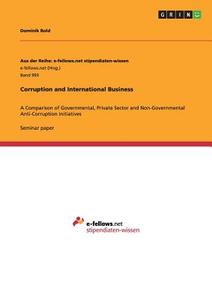
Corruption and International Business
A Comparison of Governmental, Private Sector and Non-Governmental Anti-Corruption Initiatives
- Editore:
GRIN Verlag
- EAN:
9783656741664
- ISBN:
3656741662
- Pagine:
- 24
- Formato:
- Paperback
- Lingua:
- Tedesco
Descrizione Corruption and International Business
Seminar paper from the year 2013 in the subject Business economics - Business Ethics, Corporate Ethics, grade: 1,5, University of St. Gallen (Institute for Business Ethics), course: Business Ethics in a post-crisis global economy, language: English, abstract: Until twenty years ago, the mitigation of corruption was commonly regarded as a taboo topic. Companies were able to write off bribes as expenses in their tax statements and did so, frequently. At the same time, large amounts of development aid fell into the wrong hands and disappeared into dark channels, causing a desperate resignation by the many passionate people involved. When World Bank director Peter Eigen began to engage with ending the ¿systematic corruption¿ he saw in Eastern Africa, in order to protect the citizens involved, the World Bank intervened with a memorandum from its legal department. Since then, not only NGOs, but also international organizations such as the United Nations, supra-national bodies like the European Union (EU) and many national governments have enacted statements, policies and laws fighting all different kinds of corruption. Taking into account a PricewaterhouseCoopers (PWC) study from 2008, the common presence of corruption becomes strikingly obvious. In a survey conducted by PWC analysts, 63% of the interviewed senior executives answered they had been subject to some form of actual or attempted corruption; 45% said they had refused to enter a specific market or did not pursue a particular opportunity because of corruption risks; 39% claimed that their company had lost bids because of corrupt officials and 42% shared the opinion that their competitors paid bribes. The questions that arise with that are numerous. Are these initiatives helping to fight and reduce the problem? Are private (on a company level or through NGOs) or public initiatives more effective? What can be undertaken in order to improve the performance and effectiveness of these programs? When comparing the different kinds of anti-corruption initiatives several assumptions can be inferred: firstly, governmental regulation, backed by legal action, seems to be the most powerful tool since severe sanctions such as prison sentences can be put into place. Secondly, initiatives that are backed by the private sector should have the necessary firepower due to funding and presence. Lastly, NGOs can serve as catalysts for both public and private initiatives in the best case, encouraging accountability and progress within a project.





